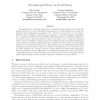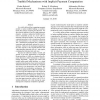8 search results - page 1 / 2 » On the probability of a rational outcome for generalized soc... |
JCT
2010
13 years 4 months ago
2010
In [11], Kalai investigated the probability of a rational outcome for a generalized social welfare function (GSWF) on three alternatives, when the individual preferences are unifo...
CORR
2010
Springer
13 years 5 months ago
2010
Springer
The well-known Impossibility Theorem of Arrow asserts that any Generalized Social Welfare Function (GSWF) with at least three alternatives, which satisfies Independence of Irrelev...
ATAL
2006
Springer
13 years 9 months ago
2006
Springer
Notions of fairness have recently received increased attention in the context of resource allocation problems, pushed by diverse applications where not only pure utilitarian effic...
TARK
2005
Springer
13 years 11 months ago
2005
Springer
The aggregation of conflicting preferences is an important issue in human society and multiagent systems. Due to its universality, voting among a set of alternatives has a centra...
SIGECOM
2010
ACM
13 years 10 months ago
2010
ACM
It is widely believed that computing payments needed to induce truthful bidding is somehow harder than simply computing the allocation. We show that the opposite is true for singl...


